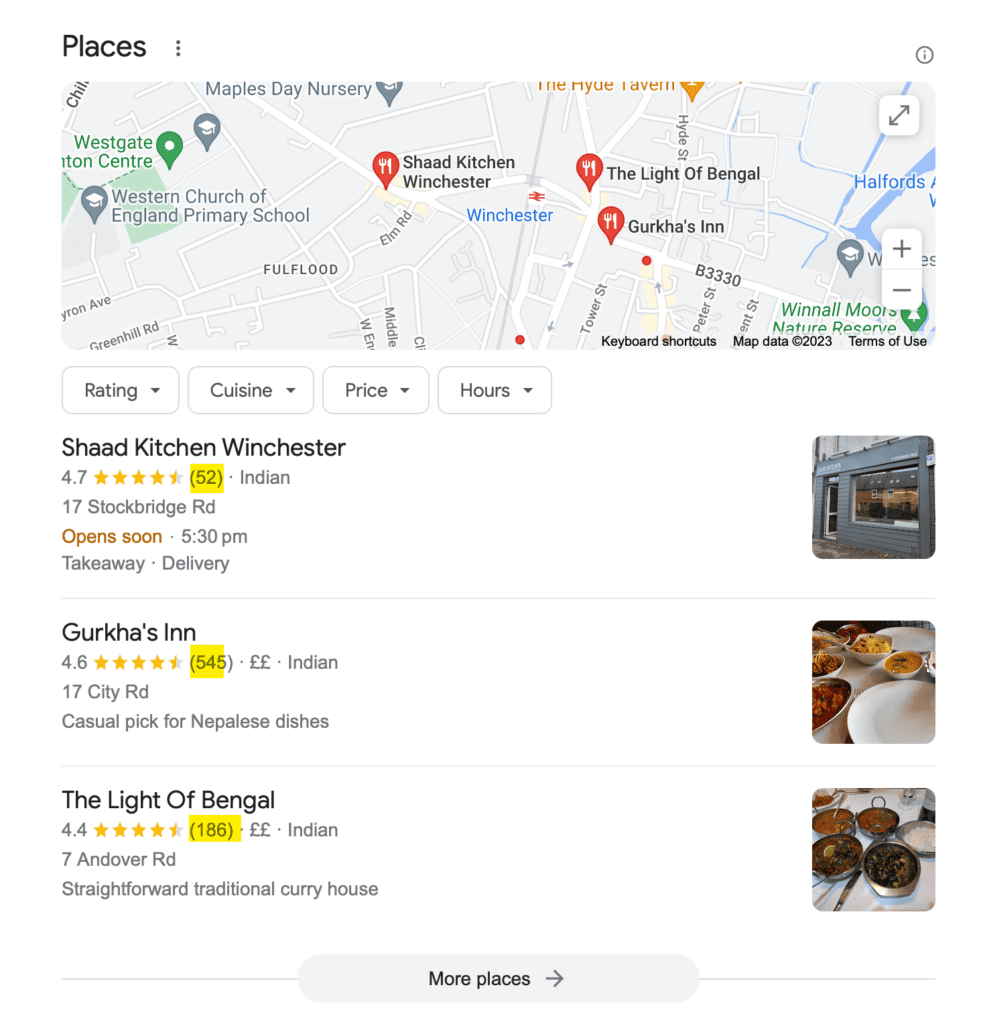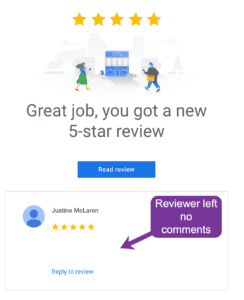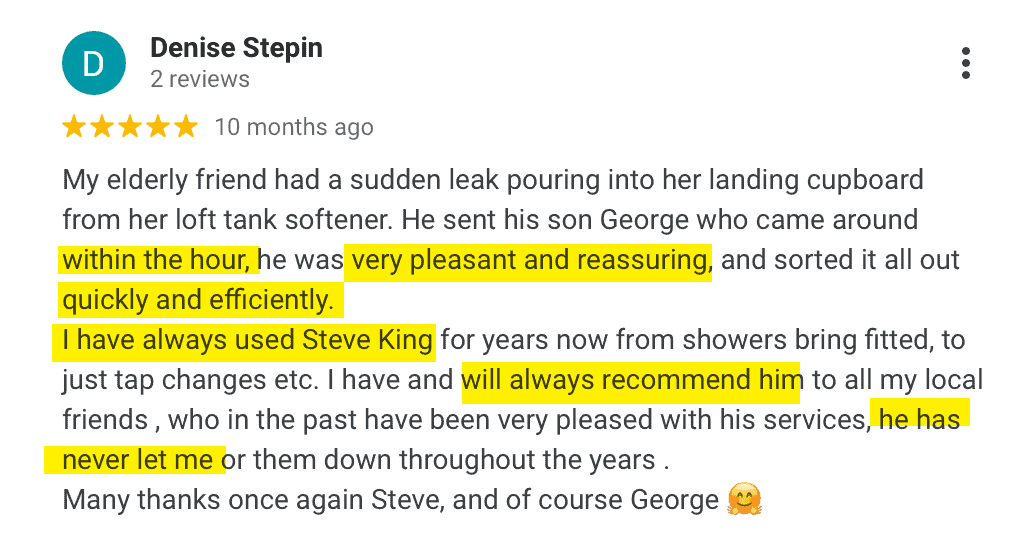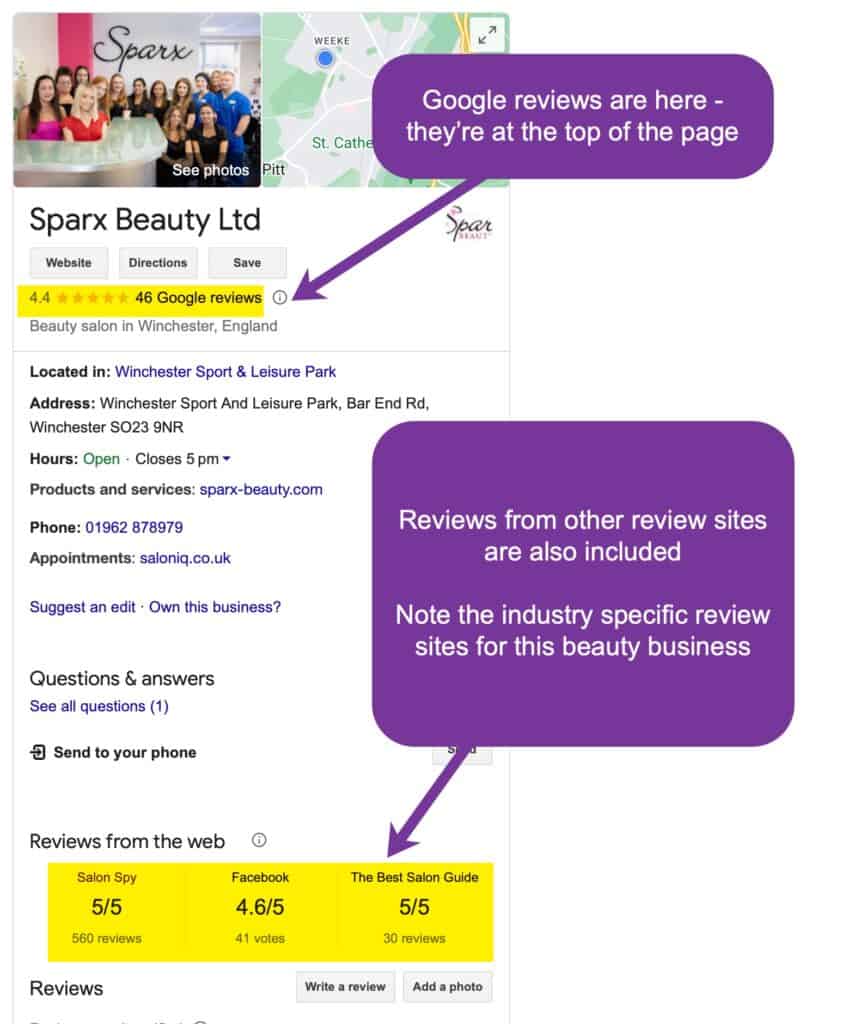Picture this: I’m on holiday with my family. We are all completely new to the area and looking for a place to eat. We also need ideas of where to go site seeing, which shops to visit.

At the heart of all of these decisions are online reviews.
Researching with reviews is so ingrained in everyone’s habits that it’s difficult to imagine a world without them. Google provide a system to encourage writing reviews to help others called local guides. I’m a local guide, and they do quite a good job of encouraging review writing behaviour.
Reviews should be your main online marketing strategy if you own a local business. Paying for advertising can work, but it can also be expensive. The best way to get new customers, in my experience, is to position your company where people can find you. Your job is to make it easy for them to find you. Online reviews are a great way to put yourself in a place where new customers can find you and convert interest to engagement. ie they find your business on a review and are convinced enough from reading the reviews to choose YOUR BUSINESS over the alternatives. An advanced review strategy can transform a 5-star review into one that converts prospects into paying customers.
Contents
- What is Google local business search relevancy?
- Examples of well-written reviews (ie ones that can convert people reading reviews to customers)
- Check list for asking for a review
- Review request templates
- Choosing the Right Review Platforms
- Timing Is Everything
- Making the Process Easy
- Expressing Gratitude and Incentivising
- Following Up on Reviews
- Handling Negative Reviews
- Leveraging Positive Reviews
- Tools and Resources for Managing Online Reviews
- Conclusion
What is Google local business search relevancy?
If you don’t use Google Business profiles, you should still read this section, as it gives great advice for any review platform you use.
For those of you who use Google Business profiles, the following will shine a light on the start of the strategy for asking for a review.
There is an obvious logic: if my business has 545 “5-star” reviews and my nearest competitor has 52 5-star reviews, my business will appear above my competitors in search results. Simple right?
That is not true – look at the following example. I searched for “Curry Winchester” and saw that Shaad Kitchen has fewer reviews than Gurka’s Inn. The difference in the count is staggering – almost 500 reviews. So whats the secret?

The answer is relevancy which stems from Google’s goal of making search results relevant. Above everything else, Google wants to make the search results match the user’s Intent. In this example, it interprets Shaads Kitchen as more relevant than the Gurkha’s inn. We have an article here. How does Google decide which reviews are Relevant that explains it in more detail.
At a high level, the key attributes need to be considered in the following way.
- Length – The number of words in a review impacted its relevance. There was a consistent correlation between the number of words contained in a review with its position in the Most Relevant rankings.
- Keywords – Using the business’s name in the review increased the post’s relevancy ranking.
- Specific – A review that contained a specific story or example was more likely to rank higher than reviews with generic content.
- Local – A review by a user who posted other reviews in the local area is deemed more relevant than a user with either no reviews or one with reviews from a different geographic location.
- Time – The more time passes since a review is posted, the less relevant it becomes. A good way of thinking this is that restaurant menus often change every season or year. Therefore a review from 2 years ago will lose its relevancy due to age.
Not all review systems will have such a sophisticated way of displaying reviews to users. Niche review sites will likely list reviews in chronological order.

Examples of well written reviews (ie ones that can convert people reading reviews to customers)
A 5-star review is awesome. Getting positive feedback on your efforts to run a business is brilliant! It releases those endorphins and gives you a warm fuzzy feeling.
Do you know what is better than a 5 – Star review? A well-written 5-star review. Let’s run through some examples of what good looks like
Review example number 1

Analysis of the review number 1
- Suzy shows she is a long-term customer – the service must be good if she keeps returning. This is a positive indicator for someone else reading the review
- Mentions specific treatments (Myofascial release) – This is good for search terms. If someone is looking for that specific type of treatment “Myofascial release”, and it’s detailed in a review for that business, then it will be MORE RELEVANT for the search results. This should send signals to Google for this business to appear higher in the search results for this related term
- Highlights that the business is a safe space to be. Again this is great for people reading the review. Knowing that the person you will be seeing is kind, empathic and “simply the best” removes barriers to getting in touch
Review example number 1

Review of review number 2
- The plumber came very quickly – this is often a significant requirement when calling a plumber, as problems can be urgent.
- The plumber was pleasant – it’s reassuring that the person visiting will be pleasant.
- The issue was resolved quickly – again when I call a plumber I typically have an urgent issue so an example of fast response and resolution is perfect.
- The reviewer has used the service over the years – this is a testament to the quality and reliability.
Checklist for asking for a review.
Use the following checklist when asking your customers for a review. If you have a good relationship with your customers, then you can go to town on this. Can the reviewer highlight any of the following
- Mention a specific employee – and if possible, the positive customer service received
- Please provide details on why they were looking for your business
- What services/products the business provided
- If the business has been used by the customer for a long time / repeat customer
- Any details such as parking and where the parking is (provide geographical landmarks if possible) – tips for other reviewers on how to find the business is always handy.
- Keywords – Make a list of the search terms and then request that these are included in the review – eg if you run a plumbing business, then “service boiler”. This trick can be effective.
- Length – Not too long. Reviews should be between 200-300 words
Timing Is Everything
Ever heard the saying, “Strike while the irons are hot”? It means taking action when taking advantage of an opportunity as soon as it exists, in case the opportunity goes away and does not return. You ideally need your customers to write a review while they’re enthusiastic about their experience. It also helps to get their review while the details are fresh in their minds. Suggestions
If the customer is face to face, you can ask them to write a review immediately. There is a small tip here. It’s not recommended for customers to use your wifi when writing their reviews. This is because it has been reported (but not confirmed) that review sites monitor the IP address of where reviews were written. If a large volume of reviews come from the same IP address, it could look like the reviews were written by one person and look like a fake review. So if your customer can use their mobile data or wifi, this is a winning idea!
Send the customer a text/message to their phone hours after they leave a review. This is another excellent option as the response rate to opening phone text messages is considerably higher (98%) compared to email (19.8%) – To maximise the efficacy of this solution, you should provide a direct link to the review page in the text message to make it easier to leave an online review (Note Leave.Reviews solution does this exceptionally well with a high level of customisation)
Choosing the Right Review Platforms
You may feel that targetting Trip Advisor reviews for tourist-type businesses and Google business reviews for local businesses is all that you need. You may be surprised that there are hundreds of different review sites. Frequently these lesser-known review sites target specific business types.

Why is choosing lesser-known review sites important?
It’s about adding more credibility to your business and also occupying more real estate on Google Search Engine Results Pages (SERP’s).
Let’s take the example on the right. It’s a beauty treatment place. The image you can see shows the business listing that appears on the right-hand side of Google (desktop). The Google review results appear at the top of this box (Taking a prime position). At the bottom, you’ll notice the aggregate results from other review sites such as Salon Spy, Facebook and The best Salon Guide.
As a business, it’s only pragamatic to request reviews from your customers for one specific review site. ie it’s not realistic to ask your customers to write a review on Google, Salon Spy, Facebook and The Best Salon Guide

